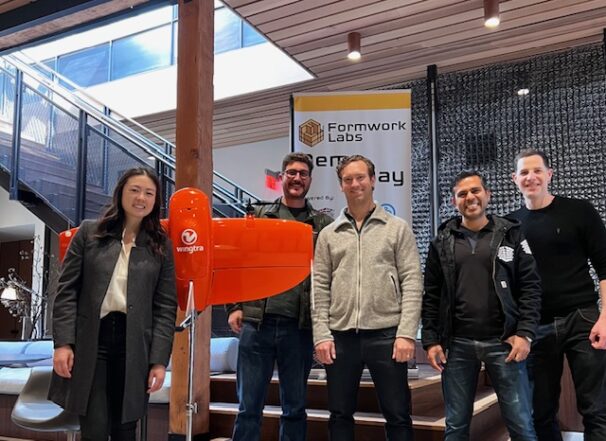 BuiltWorlds' Matt Gray (far right) visits Brick & Mortar Ventures Team Members (from left to right) Alice Leung, Guillaume Bazouin, Austin Yount and Kaustubh Pandya.
BuiltWorlds' Matt Gray (far right) visits Brick & Mortar Ventures Team Members (from left to right) Alice Leung, Guillaume Bazouin, Austin Yount and Kaustubh Pandya.
Venture West Preview
San Francisco-based Brick & Mortar Ventures - already one of the leading AEC sector-focused funds - is in growth mode. Shy of any formal announcement, a fresh fund is already starting to show up on startup cap tables, and with that, the firm joins more historically proptech-oriented funds such as MetaProp and Fifth Wall with the addition of strategically placed oversees partners.
The firm's founder and managing director, Darren Bechtel, made his mark as a pioneer in what was really an emerging field for venture investment focused on construction and adjacent technology beginning in the early part of the last decade. His early wins in Bay Area startups, PlanGrid and BuildingConnected, both sold to Autodesk in 2018 for $275 million and $875 million, respectively, and helped earn him a leading reputation in the industry, particularly in the Bay Area.
Brick & Mortar's Rare Track Record in the Sector of Nine Figure Exits
Parlaying those wins, Bechtel built a strong team and announced the close of Brick & Mortar's first fund, $97 million, backed by a host of industry players, including Ardex, Autodesk, CEMEX, Ferguson Ventures, FMI, Glodon, Haskell, Hilti, Obayashi, Sidewalk Labs and United Rentals. The firm has gone on to notch some solid doubles with the sale of field productivity system Fieldwire to limited partner Hilti in 2021 for approximately $300 million and the sale of lien payment compliance software Levelset to Procore for $500 million the same year. Even recognizing that investments in PlanGrid and BuildingConnected pre-date the formal establishment of the fund, few other built world funds can boast more mid-nine-figure exits in the relatively short life of this sector's focused fund proliferation.
Positioning For International Growth With Paris-Based Partner
Now, as the fund positions for further growth, it has recruited former Vinci innovation leader Guillaume Bazouin as a French-born, Stanford-educated full time representative in Paris. We had a chance to catch up with Guilaume last week when he was in town for a partners meeting at Brick & Mortar's new offices in downtown San Francisco ahead of our upcoming Venture West conference there. While based in Paris, Bazouin will be working with limited partners, startups and ecosystem across Europe and the Middle East, which is also quickly becoming a major center for built world tech with Saudi and United Arab Emirates firms, and also Israeli startups, investors and strategics, becoming increasingly common. Of note, Bazouin will be joining us at the BuiltWorlds Summit in Paris this June to speak more about his activities and the state of the venture ecosystem in Europe and the Middle East.
In discussions with Bazouin, he made it clear that he sees opportunities for American investors in Europe as well. He explained that the legal framework in many places across Europe is such that industry players will be forced to adopt new techniques in order to meet increasingly strict environmental regulations. In some places, landlords will no longer be able to rent space if that space does not meet environmental requirements. As a result, Bazouin sees the development of a much more evolved set of solutions oriented to carbon footprint reduction, energy efficiency and transition, and other areas of sustainability than what one finds in the US, and with that, an arbitrage opportunity.
Arbitraging Europe's Climate Tech Leadership
One example of a European company gaining traction in sustainability that Bazouin sees is Berlin-based Ecoworks, a company that last December closed a 40 million euro funding round to help promote its solution, designing and installing prefabricated facade and roof elements which allow existing buildings to meet a net zero standard. The firm asserts that almost 75 percent of existing buildings in Europe are considered energy inefficient, implying a massive market for services in those buildings will not be able to be rented without upgrades. For those who believe that these types of regulations will eventually make there way to cities in the United States, there is also an opportunity to get ahead of the wave by studying the European startup ecosystem.
While climate may be an obvious are of opportunity in the European ecosystem, Bazouin is not making climate his sole area of opportunity. Based in Paris, Bazouin points out that the Paris region is becoming a major, global center for AI technology. He cites Google's plans to establish a large AI hub there that will host 300 researchers and engineers, and also points to several local startups such as Mistral, a French AI company that powers chatbots and which was valued at $2 billion in a funding round completed late last year.
So while the Bay Area may still be a dominant force in tech, and particularly in built world tech, even the San Francisco stalwarts are seeing big opportunities in Europe and beyond - and they're positioning to seize them.

Discussion
Be the first to leave a comment.
You must be a member of the BuiltWorlds community to join the discussion.